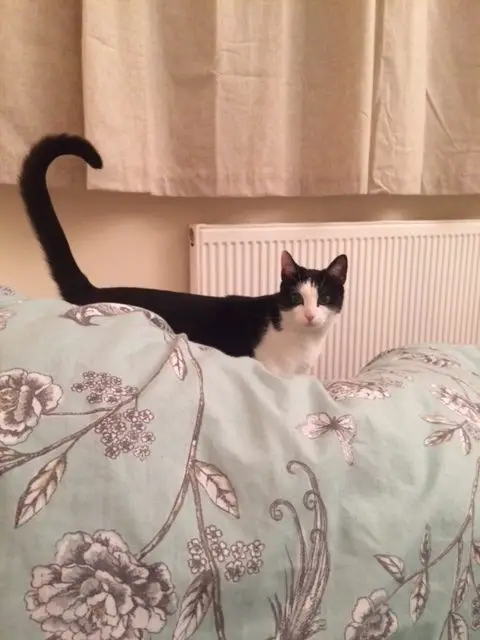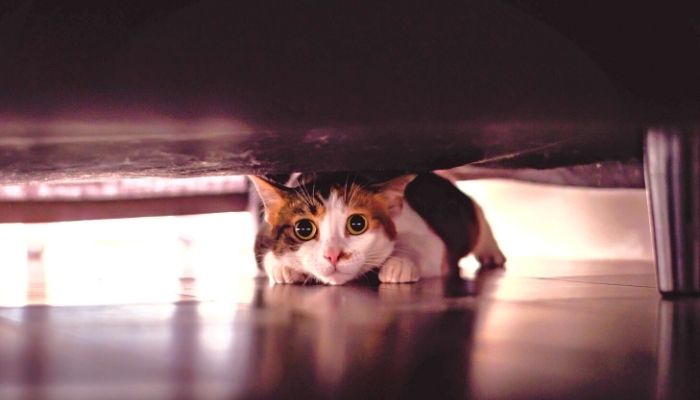There is a range of simple ways you can stop your cat from going under the bed including using physical under-bed-blockers, spraying essential oils, and laying down sheets of aluminium foil.
These all work by making the space under the bed inaccessible or less desirable for your cat.
Before trying out these techniques, be sure to provide other hiding spots so your cat has somewhere safe to go when they want to hide, rest, or simply take some time out.
Contents
1. Use An Under Bed Blocker For Cats
The most effective way to stop cats from going under the bed is by using an under-bed blocker to stop them from having access.
Under-bed blockers are inexpensive, easy to position, and are available in a range of shapes, sizes and colours.
- 【HIGH QUALITY MATERIAL】The toy blocker made of BPA free safe waterproof PVC with super strong adhesive, keep simple and elegant when stick on the floor Easy removable and washable. No damage to your floor, a good gap stopper for under furniture. NOTE!! ONLY WORK FOR THE GAP UNDER 3 HEIGHT!!
They simply act as a bumper to close the gap around the edge of the bed.
The Upstone Blockers are transparent so create a sleek barrier that doesn’t impact the appearance of the room.
Blockers are excellent for stopping your cat from going under the bed and also ensure no toys or other items end up under there either.
How To Make A DIY Under Bed Blocker For Cats
If you are looking for an easy, budget solution you could make your own bed blocker by using cardboard boxes, shoeboxes, old books, or other similar items you have around the house.
Cut the cardboard down to size and secure it around the edge of the bed using heavy-duty tape.
If you have old books, they can simply be stacked to create a heavy barrier that fills the gap.
Another DIY technique is taking pipe insulation and attaching them together using zip ties.
Once it is the right height, the insulation can be placed under the bed as a makeshift barrier.
2. Use A Motion Activated Deterrent
If under-bed blockers aren’t suitable for your situation, an excellent option is a motion-activated deterrent.
- Odourless spray deterrent to safely and effectively train your pet to avoid work surfaces and other no-go areas
- Gentle but effective avoidance training for both cats and dogs of all sizes and breeds
- Adjustable motion detection range to accurately detect movement up to 1 metre away
- Up to five directions of spray for customised training
- 80-100 sprays between refills with on/off switch to conserve battery life when not in use
You can position this odourless spray on the bedroom floor and if your cat is detected the spray will go off, immediately deterring them from the area.
This is a great technique because it works when you’re not around and your cat will quickly learn the rule applies all the time, not just when you are keeping an eye on them.
Many owners find that once their cat has set the spray off a couple of times they learn to avoid the area.
The deterrent lasts 80-100 sprays so if your cat is still going near the bed, the spray will continue to deter them.
This motion-activated deterrent can be turned on and off as needed to prevent accidental activation when you are walking around the bedroom.
3. Provide Alternative Places To Hide
Your cat is probably using the bed as a hideout spot that allows them to get away from loud noises, new people, and even other cats in the house.
It’s important to provide your cat with other places to hide when they feel like they need some time out.
When creating hiding spots make sure they are safe, quiet, and warm.

Cats generally love shelves, cat trees and sheltered spots away from the busy areas of the home.
Position the new sleeping spots in areas with low foot traffic.
Blankets, toys, and catnip could all be used to help introduce your cat to the new sleeping spots.
4. Use Essential Oils
There are certain essential oils that cats don’t like, usually because the smell of them is overpowering.
Spraying essential oils such as citronella oil under the bed is a simple way of making the space under the bed less appealing for your cat.
Citronella oil is a non-toxic option that can be sprayed or put onto a cloth and wiped around the bed frame.
The smell of the oil soon wears off so it will need to be sprayed a couple of times a day for the first few days while your cat finds other hideout spots.
Different cats react differently to essential oils but more often than not they find the smells too strong and it’s an effective way of keeping cats out of certain areas.
As some essential oils are toxic, it’s important you use them safely.
5. Lay Aluminium Foil Sheets Under The Bed
Another low-cost solution is to place sheets of aluminium foil under the bed.
These can be loosely taped down to stop them from moving around.
Cats don’t like the feeling or sound of the foil so will avoid touching it or walking across it.
As the aluminium foil will make the area under the bed much less appealing, the cats will search out other hiding spots.
6. Keep Them Out Of Your Bedroom
If your cat seems to always find ways to get under the bed, you may want to consider keeping the bedroom door closed.

Once your cat goes under the bed it can be really difficult to coax them out and if your cat has become insistent on being under the bed for long periods of time then keeping the door closed may be the best option.
It will take some time for your cat to get used to not being allowed in the bedroom but they will adapt and find new hideout spots.
7. Buy A New Bedframe With No Space Beneath It
The final option is to buy a bed without space under the frame.
There are lots of great bed frames available that feature a solid frame rather than legs.
These bed frames look great and your cat will no longer have the option of hiding under the bed.
Reasons Your Cat Hides Under Your Bed:
Cats hide under beds for a number of reasons.
The most common reasons include:
1. They are in a new environment
If you have just brought your cat home then they might hide under the bed.
In this situation, you may want to give the cat a few days to adjust.
Place food, water, and a litter box in the room for the first couple of days.
If you are bringing a new cat home, consider providing appropriate hiding places and closing the bedroom doors or blocking the gaps under the beds.
2. They want time alone
It’s not uncommon for cats to want to spend some time on their own.
They often like to sit and watch the world go by but sometimes they choose quiet spots where they can rest.
Cats like places that are tight, cozy, and quiet so under the bed is perfect.
3. They are afraid
If something has scared your cat they may have darted under the bed.
The cause could be anything from a loud noise to a new person in the house.
If your cat is hiding under the bed through fear, it is best to talk calmly to a scared cat and let them come out in their own time.
4. It’s their favourite sleeping spot
Cats love to sleep and your cat might have decided that being under the bed is the best place to nap.
Your cat is probably sleeping under the bed because they know they won’t be disturbed.
5. They are unwell
When cats are injured or unwell they tend to hideaway.
If you’ve noticed your cat is hiding more than usual, lookout for signs of illness or injury.
This may include lethargy, vomiting, eating or drinking more or less than usual, diarrhoea or constipation, and coughing.
They may also have visible wounds or be limping or moving differently.
Should You Let Your Cat Hide Under Your Bed?
It isn’t usually a problem for a cat to hide under a bed for a short amount of time.
Cats choose the space under the bed because they see it as somewhere safe and comfortable.
However, if they make a habit of hiding there then the risks will likely outweigh the positives.
The potential risks include:
- Getting stuck
- Getting injured
- Allergies or respiratory issues triggered by the dust under the bed
- Not being able to get your cat out from under the bed when necessary
- Damage to the bed frame/ mattress
As an Amazon Associate I may earn a small fee from qualifying purchases at no extra cost to you. This helps us run the site, so thanks for your support!










Leave a Comment